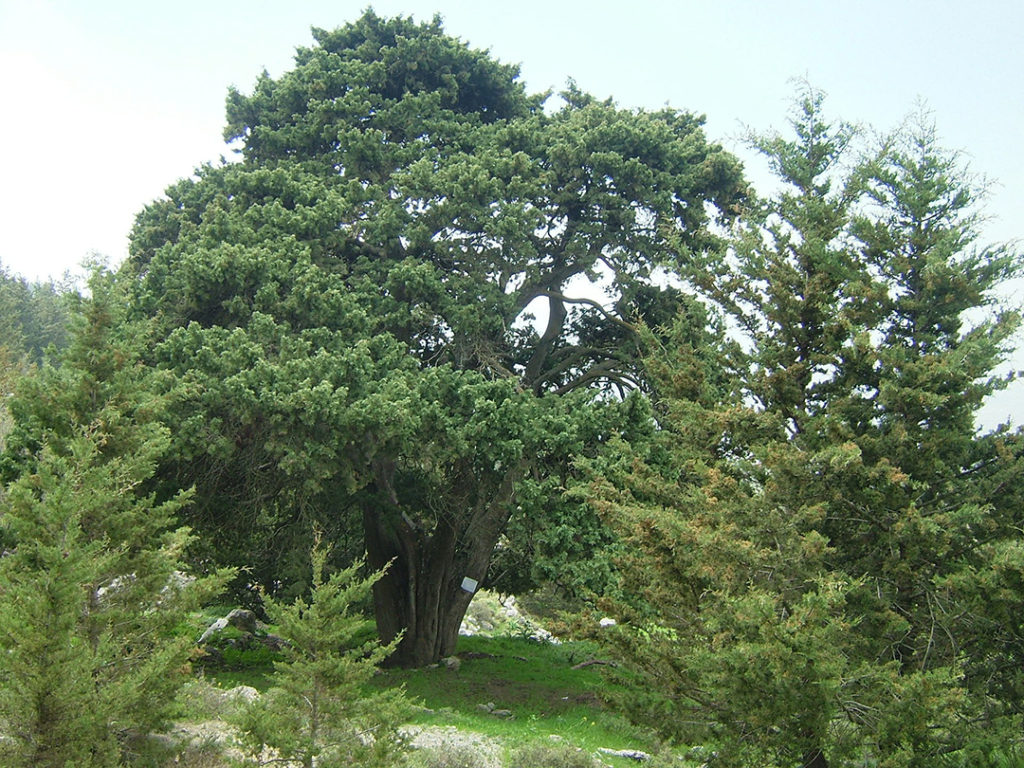
Greece
Cypress
Cupressus sempervirens

General Description / Cultural Significance
The native Cypress tree, with its iconic geometric silhouette, is representative of Greece today and historically. Cupressus sempervirens is an evergreen tree from the Cupressaceae that grows flowers and cones and emits a highly aromatic scent. The tree is part of many ancient stories, and in Greece, the god Apollo was said to have been raised in a Cypress grove. Ancient Greeks used the wood from the tree to build furniture and doors. It had early use in building coffins in the Middle Ages, and therefore is forever associated with burial, grief, and peace. It is planted near cemeteries even today.
The tree is known for its wide variety of other uses too, including medical. It has long been used as a cough and flu treatment in traditional medicine as well as other respiratory and circulatory conditions. Scientific research has confirmed its antimicrobial, antiviral, and antioxidant properties among others. Its phenolic constituents and essential oils are said to be the cause for this. Its essential oils are distilled from twigs, needles, and cones from the tree, resulting in an aroma that varies depending on where the tree was harvested, but is often fresh, pine-like, smoky, and soothing. It reminds whoever smells it of a forest, and this aroma is understood to be helpful with times of transition and grief.
Climate Change/Conservation Status
The unique properties of the Cypress may have a new poignancy in the anthropocene era where wildfires are devastating many parts of the world, including Greece. The Cypress trees have been used as firebreaks to halt wildfires in the Mediterranean in recent decades, and research has determined that the tree is one of the most fire-resistant species in the natural, local environment. Research is continuing to find the exact aspects of the Cypress that make is resistant to fire. In the meantime, more trees are being planted as firebreaks. Its fire resistance makes it valuable not only in Greece, but throughout the Mediterranean region.
Rising temperatures are increasingly felt in Greece, which is affecting both agriculture and tourism. A report from the National Bank of Greece concluded that if climate change continues as expected until 2050 and 2100 without a global effort to reduce greenhouse gas emissions, then this will cause huge damage to the Greek economy. Flooding, too, is expected to increase, and Greece’s port cities are bracing, as Greece has the 11th largest coastline in the world.
An example of the devastation fueled by climate change are the deadly wildfires that encompassed the village of Kineta, Greece in July of 2018. Nearly 100 people were killed, and nearly 200 hospitalized. Hundreds were forced to evacuate in a wind-fueled tragedy that is not uncommon to Greece.
Cupressus sempervirens is currently considered not endangered and a species of Least Concern by the IUCN. Because the species is tolerant of drought, wind dust, sleet, and atmospheric gases, it is hardy against many of the effects of climate change, which makes it a very valuable tree indeed.
On August 2, 2021 The National Observatory of Athens weather service announced the highest temperature ever officially recorded in Greece—46.3 degrees Celsius, or 115.3 degrees Fahrenheit. The record temperatures are part of a heat wave fueling fires in Southern Europe.
The increase of wildfires fires in Greece in recent decades is the damage of climate change. The wildfire that began July 21, 2021, swept the island of Evia, burning 120,000 acres of forest causing mass evacuations of entire villages, is but one of a series. On the same island in 2007, a wildfire scorched 670,000 acres of forest and farmland. Greece’ own shipping magnates are being looked at for their carbon footprint and influence on the country’s politics. Because of the repeated periods of dense smoke from the blazes, one Athens journalist is speculating that Athens could become the first uninhabitable capitol city in Europe.
Alternate Names
Common Cypress
Italian Cypress
Mediterranean Cypress
Sources
Clapp, A., 2021. The Fires in Greece Are a Terrifying Warning. The New York Times. [website]

